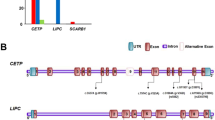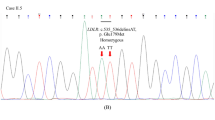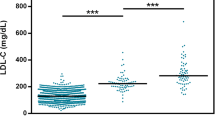Abstract
The low-density lipoprotein receptor (LDLR) prevents hypercholesterolemia and atherosclerosis by removing low-density lipoprotein (LDL) from circulation. Mutations in the genes encoding either LDLR1 or its ligand (APOB)2 cause severe hypercholesterolemia. Missense mutations in PCSK9, encoding a serine protease in the secretory pathway3, also cause hypercholesterolemia4. These mutations are probably gain-of-function mutations, as overexpression of PCSK9 in the liver of mice produces hypercholesterolemia5,6,7 by reducing LDLR number. To test whether loss-of-function mutations in PCSK9 have the opposite effect, we sequenced the coding region of PCSK9 in 128 subjects (50% African American) with low plasma levels of LDL and found two nonsense mutations (Y142X and C679X). These mutations were common in African Americans (combined frequency, 2%) but rare in European Americans (<0.1%) and were associated with a 40% reduction in plasma levels of LDL cholesterol. These data indicate that common sequence variations have large effects on plasma cholesterol levels in selected populations.
This is a preview of subscription content, access via your institution
Access options
Subscribe to this journal
Receive 12 print issues and online access
$209.00 per year
only $17.42 per issue
Buy this article
- Purchase on Springer Link
- Instant access to full article PDF
Prices may be subject to local taxes which are calculated during checkout



Similar content being viewed by others
References
Goldstein, J., Hobbs, H. & Brown, M. Familial hypercholesterolemia. in The Metabolic and Molecular Bases of Inherited Disease, vol. II (eds. Scriver, C., Beaudet, A., Sly, W. & Valle, D.) 2863–2913 (McGraw Hill, New York, 2001).
Innerarity, T.L. et al. Familial defective apolipoprotein B-100: a mutation of apolipoprotein B that causes hypercholesterolemia. J. Lipid Res. 31, 1337–1349 (1990).
Seidah, N.G. et al. The secretory proprotein convertase neural apoptosis-regulated convertase 1 (NARC-1): liver regeneration and neuronal differentiation. Proc. Natl. Acad. Sci. USA 100, 928–933 (2003).
Abifadel, M. et al. Mutations in PCSK9 cause autosomal dominant hypercholesterolemia. Nat. Genet. 34, 154–156 (2003).
Maxwell, K.N. & Breslow, J.L. Adenoviral-mediated expression of Pcsk9 in mice results in a low-density lipoprotein receptor knockout phenotype. Proc. Natl. Acad. Sci. USA 101, 7100–7105 (2004).
Park, S.W., Moon, Y.A. & Horton, J.D. Post-transcriptional regulation of LDL receptor protein by proprotein convertase subtilisin/kexin type 9a (PCSK9) in mouse liver. J. Biol. Chem. 279, 50630–50638 (2004).
Benjannet, S. et al. NARC-1/PCSK9 and its natural mutants: zymogen cleavage and effects on the LDLR and LDL-cholesterol. J. Biol. Chem. 279, 48865–48875 (2004).
Timms, K.M. et al. A mutation in PCSK9 causing autosomal-dominant hypercholesterolemia in a Utah pedigree. Hum. Genet. 114, 349–353 (2004).
Leren, T.P. Mutations in the PCSK9 gene in Norwegian subjects with autosomal dominant hypercholesterolemia. Clin. Genet. 65, 419–422 (2004).
Victor, R.G. et al. A population-based probability sample for the multidisciplinary study of ethnic disparities in cardiovascular disease: recruitment and validation in the Dallas Heart Study. Am. J. Cardiol. 93, 1473–1480 (2004).
Miettinen, T.A., Tilvis, R.S. & Kesaniemi, Y.A. Serum plant sterols and cholesterol precursors reflect cholesterol absorption and synthesis in volunteers of a randomly selected male population. Am. J. Epidemiol. 131, 20–31 (1990).
Otvos, J.D. Measurement of lipoprotein subclass profiles by nuclear magnetic resonance spectroscopy. in Handbook of Lipoprotein Testing, Ch. 28 (eds. Rifai, N., Warnick, G.R. and Dominiczack, M.H.) 497–508 (AACC Press, Washington, DC, 1997).
Horton, J.D. et al. Combined analysis of oligonucleotide microarray data from transgenic and knockout mice identifies direct SREBP target genes. Proc. Natl. Acad. Sci. USA 95, 5987–5992 (1998).
Cohen, J.C. et al. Multiple rare alleles contribute to low plasma levels of HDL cholesterol. Science 305, 869–872 (2004).
Shioji, K. et al. Genetic variants in PCSK9 affect the cholesterol level in Japanese. J. Hum. Genet. 49, 109–114 (2004).
Hofer, F. et al. Members of the low density lipoprotein receptor family mediate cell entry of a minor-group common cold virus. Proc. Natl. Acad. Sci. USA 91, 1839–1842 (1994).
Agnello, V., Abel, G., Elfahal, M., Knight, G.B. & Zhang, Q.X. Hepatitis C virus and other flaviviridae viruses enter cells via low density lipoprotein receptor. Proc. Natl. Acad. Sci. USA 96, 12766–12771 (1999).
Mostaza, J.M., Schulz, I., Vega, G.L. & Grundy, S.M. Comparison of pravastatin with crystalline nicotinic acid monotherapy in treatment of combined hyperlipidemia. Am. J. Cardiol. 79, 1298–1301 (1997).
Wilund, K.R. et al. Plant sterol levels are not associated with atherosclerosis in mice and men. Arterioscler. Thromb. Vasc. Biol. 24, 2326–2332 (2004).
Marcovina, S.M., Albers, J.J., Gabel, B., Koschinsky, M.L. & Gaur, V.P. Effect of the number of apolipoprotein(a) kringle 4 domains on immunochemical measurements of lipoprotein(a). Clin. Chem. 41, 246–255 (1995).
Qin, Z.S., Niu, T. & Liu, J.S. Partition-ligation-expectation-maximization algorithm for haplotype inference with single-nucleotide polymorphisms. Am. J. Hum. Genet. 71, 1242–1247 (2002).
Acknowledgements
We thank the Dallas Heart Study Investigators10, especially R. Victor for spearheading the study, D. Willett for designing and managing the database and S. Grundy and G. Vega for measuring plasma lipoprotein levels; B. Gilbert, H. Brookman and T. Eversole for collecting blood from families and processing the samples; T. Hyatt, S. Niu and C.J. Horton for technical assistance; R. Cooper for providing genomic DNA samples from Chicago and Nigeria; and M.S. Brown, J.L. Goldstein, J. Horton, A. Sparks and D. Cox for discussions. This work was supported by grants from the Donald W. Reynolds Foundation, The Perot Family Fund, the LeDucq Foundation and the National Institutes of Health. C.K.G. is supported by the Parker B. Francis Family Foundation.
Author information
Authors and Affiliations
Corresponding author
Ethics declarations
Competing interests
The authors declare no competing financial interests.
Rights and permissions
About this article
Cite this article
Cohen, J., Pertsemlidis, A., Kotowski, I. et al. Low LDL cholesterol in individuals of African descent resulting from frequent nonsense mutations in PCSK9. Nat Genet 37, 161–165 (2005). https://doi.org/10.1038/ng1509
Received:
Accepted:
Published:
Issue Date:
DOI: https://doi.org/10.1038/ng1509
This article is cited by
-
Pla2g12b drives expansion of triglyceride-rich lipoproteins
Nature Communications (2024)
-
Efficient prime editing in mouse brain, liver and heart with dual AAVs
Nature Biotechnology (2024)
-
Association of high proprotein convertase subtilisin/kexin type 9 antibody level with poor prognosis in patients with diabetes: a prospective study
Scientific Reports (2023)
-
Methods for CRISPR-Cas as Ribonucleoprotein Complex Delivery In Vivo
Molecular Biotechnology (2023)
-
Low LDL Cholesterol Is Not an Independent Risk Factor for Hepatic Steatosis
Digestive Diseases and Sciences (2023)



